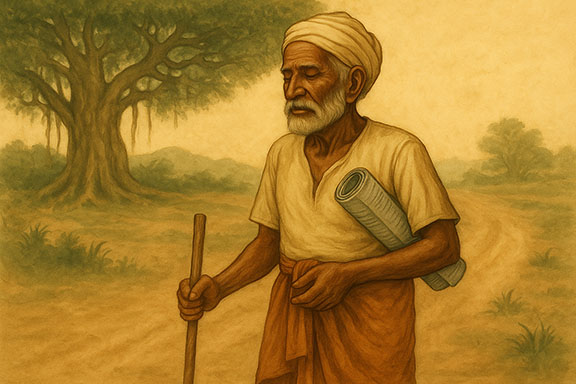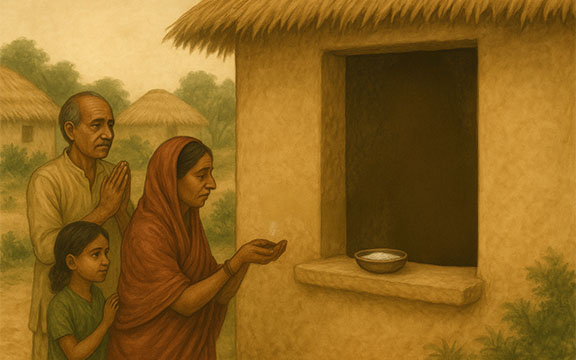
Illustration: “Paper Baba” walking with newspaper.
After spending several years immersed in sadhana under the guidance of Sadhu Swamigal at his ashram in Palani, Ramaswamy—who would one day be known to the world as Swami Satchidananda—felt a stirring once again in his soul. His heart was restless, not from dissatisfaction, but from a deeper pull—a call from the formless silence that sometimes whispers through the lips of strange saints and hidden masters.
South India was, and still is, a land steeped in spiritual mystery. Especially in Tamil Nadu, it is said that the Siddhas—realized beings of tremendous yogic attainment—still walk among us, often in disguise. Some appear as wanderers, vagrants, even madmen, their greatness cloaked in rags and eccentric behavior. These are the ones who have burned away not just the bonds of past karma but have crushed the roots of future karma itself. They are not limited by caste, dogma, or name. They are known by their presence—and sometimes, by strange titles passed down in hushed voices.
One such being was “Paper Baba,” a Siddha said to roam the small town of Ilanji, about 117 miles from Palani. His name came not from any scripture he wrote, but from the simple, everyday newspaper he always carried under his arm, as if shielding something deeper within. With a stick in one hand and a bundle of mysteries in the other, Paper Baba was known to give no person shelter, no disciple initiation—but he would speak if your heart was sincere enough.
Ramaswamy had heard whispers of him. And something about those whispers tugged at the thread of his longing. He had never seen him, but he felt a pull to find this Paper Baba. Perhaps it was not the sage himself, but what he represented—another glimpse into the great river of Siddha wisdom, and a chance to be further purified by spiritual fire once again.
Leaving the ashram temporarily, entrusting his kitchen duties to another, Ramaswamy journeyed to Ilanji—likely by bullock cart or on foot, as was common for wandering sadhus. Arriving, he asked where Paper Baba might be found.
“He has just passed this way,” someone said. “If you run, you might catch him.”
And so he ran.
At the end of the road, there was no one. Again, he asked.
“There,” said another. “Just turned the corner.”
Each time, he arrived just as the figure had vanished. It was as if he were being drawn not to a man, but to the essence of the search itself—a dance of presence and absence, form and the elusive formless. Finally, Ramaswamy spotted him: an old man, seemingly blind, feeling his way down the street with his stick, a rolled newspaper tucked tightly beneath his arm. As Ramaswamy approached silently, the old man whirled around with a suddenness that startled him.
“Who are you?” the sage barked. “Why are you following me?”
“I am a humble seeker, Swamiji. I’ve come for your blessings.”
“Who blesses whom? Go away!”
But Ramaswamy was not one to be discouraged. “If you are blind, how did you know I was behind you?”
“Oh, so you came to spy on me, hmm?” the old man challenged. “Now go. Run away!”
“I have come too far to leave without your blessing,” Ramaswamy replied calmly.
“You’ve seen me. That’s enough. Now go.”
“I’m not going.”
The sage raised his stick. “I will hit you!”
“Then I’ll receive something from you at least,” Ramaswamy replied with a slight smile. “If you decide to bless me that way, I will accept it.”
The old man paused, studied him with unseen eyes, and then relented. “You are a stubborn fellow. Fine. Come along.” The two walked together to the home of a wealthy devotee. Paper Baba sat at the center of the room, calling to his host, “See? This dog followed me all the way here.”
Then he turned to Ramaswamy. “You have to feed people. Why are you here? Go do your job.”
“I came for your blessing,” Ramaswamy replied again.
Paper Baba sighed. Then, passing on something that seemed sacred, he handed him a basket of limes—normally given out one at a time as prasad. “Take it. All for you. But don’t keep it all. Share it.” Ramaswamy joyfully began offering the limes to everyone present.
“Good,” said Paper Baba. “Now take the rest. Don’t give everything away. Keep some. Now go—and don’t keep running after me. Go!” As Ramaswamy bowed before him, the sage softened saying, “Everything will be all right. Go ahead.”
This brief but profound encounter carried more than just a basket of fruit. It was a transmission—of courage, tenacity, humility, and perhaps a Siddha’s encouragement and guiding wisdom.

Illustration of Hut with Bowl of Vibhuti, Holy Ash.
Returning to Palani, Ramaswamy felt called not to reenter the ashram immediately, but to go deeper into solitude. A devotee named Sri Kalidas offered him a hut just outside the town. Each day, Kalidas sent him a simple meal—steamed iddlis and temple prasad. It was all he ate. For 51 days, Ramaswamy lived in seclusion, immersed in intensive sadhana. Something was shifting in him. He had been under the care of great teachers, he had sought the hidden masters, and now the mastery itself was awakening within him. Pilgrims began to come, unbidden. Some sought wisdom. Others sought healing.
To all, Ramaswamy offered only what he had—a heart immersed in God and a bowl filled with vibhuti, sacred ash. He gave freely, but always with the awareness that it was not “he” who healed. He asked the Divine to bless those who came.
“My child is sick,” one said.
“Take a little ash. Put it on the stomach.”
Another came at midnight. “My wife is in painful labor.”
“Mix the ash with water. Give it to her.”
Each time, the remedy worked. But eventually, Ramaswamy began to question the role he was playing. His inner voice whispered: “Do not interfere with the karma others are meant to undergo. You are not the doer.”
He stopped asking the Divine for curative powers. Instead, he began guiding seekers toward practices they could engage in themselves—through breath, diet, and mantra. Healing no longer came as a miracle from him, but as a result of the practices he offered, imbued with his blessing energy. In this way, the transformation arose not from his intervention alone, but from the seekers’ own sincere efforts, empowered and uplifted by his compassionate grace.
This was the beginning of his own becoming—a Siddha not merely by association, but by inner realization. He had seen how powers could be used, but also how they could subtly bind. He chose the path of liberation for himself and for others—not dependency, but empowerment.
The Siddha tradition, or Siddha Margam, is one of the most ancient and esoteric streams of Indian spirituality. Rooted deeply in Tamil Nadu, it speaks not of renunciation alone, but of transformation—of turning the body into a vessel of light and the mind into a mirror of truth. Siddhas are not saints by appearance, but perfected beings who live beyond time. They have not only untied the knots of past karma—they have squeezed the roots of future karma dry.
In many ways, Ramaswamy was entering that stream. He had walked the roads they walked. He had received their transmission. And now, quietly and humbly, he was becoming one of them. Soon, his journey would take him to others—more hidden Siddhas, more sacred encounters. And everywhere, he found the same Presence quietly reflecting itself, in the silence and stillness within.
Already, the seeds of his own awakening were beginning to flower. He had followed the scent of the Divine into the most unlikely place: behind blind eyes, beneath an old newspaper, and within the silence of his own heart. More would soon be revealed…

